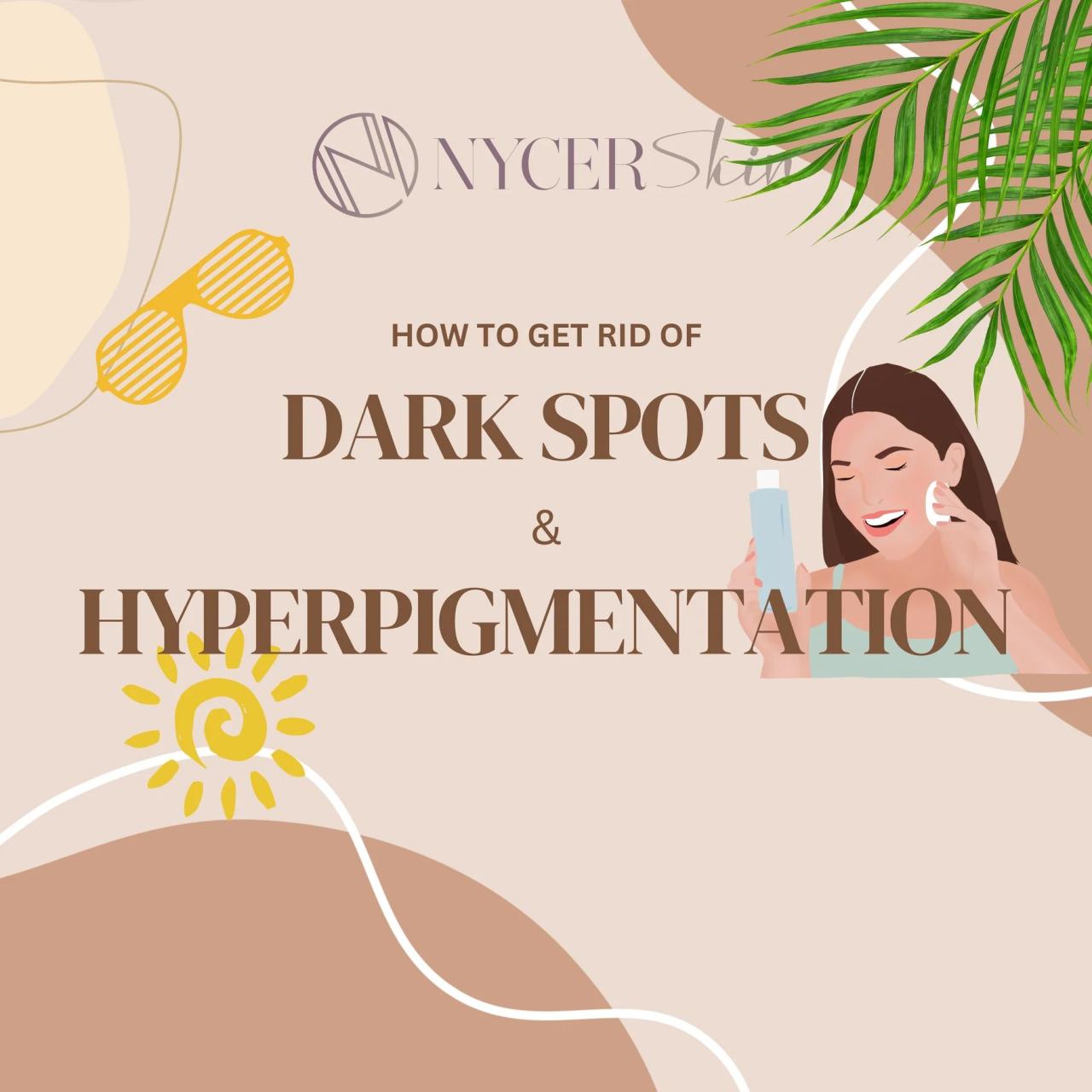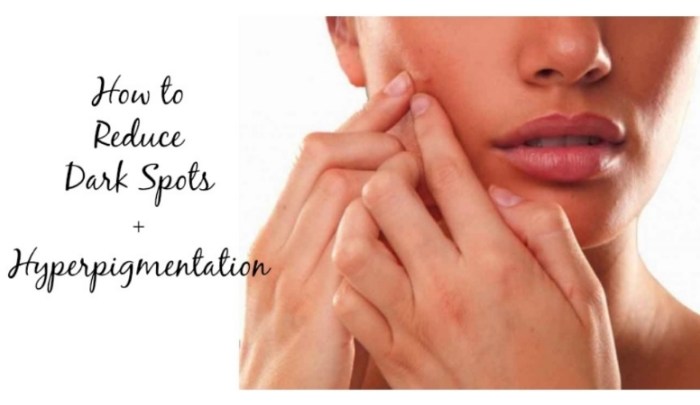
How to reduce dark spots and hyperpigmentation: Starting off with this essential topic, we delve into effective ways to achieve clear and healthy skin. From understanding the causes to exploring treatments, this guide covers it all.
Understanding Dark Spots and Hyperpigmentation
Dark spots and hyperpigmentation are common skin concerns that can affect people of all skin types and tones. Dark spots are areas of skin that appear darker than the surrounding skin due to an excess production of melanin, the pigment that gives skin its color.
On the other hand, hyperpigmentation refers to the overproduction of melanin in certain areas of the skin, leading to patches of skin that are darker than the rest of the complexion.
Causes of Dark Spots and Hyperpigmentation
Dark spots and hyperpigmentation can be caused by a variety of factors, including:
- Excessive sun exposure: UV rays can stimulate the production of melanin, leading to dark spots.
- Hormonal changes: Pregnancy, menopause, and birth control pills can trigger hormonal fluctuations that result in hyperpigmentation.
- Inflammation: Skin conditions like acne, eczema, and psoriasis can cause dark spots as a result of inflammation.
- Aging: As we age, the skin’s ability to regenerate and repair itself diminishes, leading to dark spots and hyperpigmentation.
Differences between Dark Spots and Hyperpigmentation
Dark spots are typically small, flat spots that are usually caused by sun exposure or aging. On the other hand, hyperpigmentation refers to larger areas of skin that are darker than the surrounding skin and can be caused by a variety of factors such as hormonal changes, inflammation, and genetics.
Lifestyle Changes for Reducing Dark Spots

When it comes to reducing dark spots and hyperpigmentation, making certain lifestyle changes can play a significant role in improving the condition of your skin.
Protecting the Skin from Sun Exposure
Excessive sun exposure can exacerbate dark spots and hyperpigmentation. It is essential to protect your skin from harmful UV rays to prevent further damage.
- Always apply sunscreen with a high SPF before going out in the sun.
- Wear protective clothing, hats, and sunglasses to shield your skin from direct sunlight.
- Avoid prolonged sun exposure, especially during peak hours when the sun’s rays are strongest.
Importance of a Healthy Diet
A healthy diet rich in antioxidants and vitamins can help in reducing dark spots and promoting overall skin health.
- Incorporate foods high in vitamin C, such as citrus fruits, berries, and leafy greens, into your diet.
- Eat foods rich in vitamin E, like nuts, seeds, and avocados, to help nourish your skin from within.
- Stay hydrated by drinking plenty of water throughout the day to flush out toxins and maintain skin elasticity.
Role of Hydration
Proper hydration is crucial for maintaining skin health and reducing the appearance of dark spots.
- Drink at least 8-10 glasses of water daily to keep your skin hydrated and plump.
- Use hydrating skincare products with ingredients like hyaluronic acid to lock in moisture and improve skin texture.
- Avoid excessive alcohol consumption and caffeinated beverages, as they can dehydrate the skin and worsen hyperpigmentation.
Skincare Products and Treatments

When it comes to reducing dark spots and hyperpigmentation, using the right skincare products and treatments can make a significant difference in improving skin tone and texture. Here are some common options that can help address these concerns:
Common Skincare Products for Dark Spots
- 1. Vitamin C serums: Vitamin C is known for its brightening properties and can help reduce the appearance of dark spots over time.
- 2. Retinol creams: Retinol is a powerful ingredient that can promote skin cell turnover and fade dark spots gradually.
- 3. Niacinamide creams: Niacinamide is effective in reducing inflammation and hyperpigmentation, making it a great option for addressing dark spots.
Benefits of Serums and Creams for Hyperpigmentation, How to reduce dark spots and hyperpigmentation
Using serums and creams specifically formulated for hyperpigmentation can provide targeted treatment and benefits such as:
- 1. Penetrating deep into the skin to target dark spots directly.
- 2. Enhancing skin cell turnover and renewal for a more even skin tone.
- 3. Providing hydration and nourishment to improve overall skin health.
Effectiveness of Professional Treatments
Professional treatments like chemical peels and laser therapy can offer more intensive solutions for stubborn dark spots and hyperpigmentation. These treatments work by:
- 1. Exfoliating the skin to remove pigmented cells and encourage new cell growth.
- 2. Stimulating collagen production to improve skin texture and tone.
- 3. Targeting specific areas of hyperpigmentation for more visible results.
Herbal Remedies for Dark Spots
When it comes to reducing dark spots and hyperpigmentation, herbal remedies can be a natural and effective solution. These remedies often utilize ingredients like licorice extract, aloe vera, and essential oils to target and fade dark spots on the skin.
Natural Ingredients for Dark Spot Reduction
- Licorice Extract:Licorice extract contains glabridin, a compound that helps to inhibit the enzyme that triggers pigmentation in the skin. This can help to lighten dark spots and even out skin tone.
- Aloe Vera:Aloe vera is known for its soothing and healing properties. It can help to reduce inflammation and promote skin regeneration, which can be beneficial for fading dark spots over time.
Benefits of Essential Oils for Hyperpigmentation
- Tea Tree Oil:Tea tree oil is a powerful essential oil with anti-inflammatory and antimicrobial properties. It can help to reduce redness and irritation associated with dark spots, while also preventing further pigmentation.
- Lavender Oil:Lavender oil is another essential oil that is known for its calming and skin-healing properties. It can help to promote skin cell turnover and reduce the appearance of dark spots.
Complementing Traditional Skincare Routines
Herbal remedies can be a great addition to your existing skincare routine. They can complement traditional skincare products and treatments by providing natural and gentle solutions to target dark spots and hyperpigmentation. By incorporating herbal remedies into your daily skincare regimen, you can help to enhance the overall effectiveness of your dark spot reduction efforts.
Wellness Programs for Skin Health
When it comes to improving skin health and reducing dark spots, wellness programs play a crucial role. These programs focus on holistic approaches to skincare that address not just the external factors but also internal well-being.
Stress Management for Reducing Dark Spots
Stress is a major contributing factor to the formation of dark spots and hyperpigmentation. It triggers the release of cortisol, which can lead to an increase in melanin production. Therefore, managing stress is essential in reducing dark spots and achieving overall skin health.
- Practice relaxation techniques such as deep breathing, meditation, or yoga to reduce stress levels.
- Engage in physical activities like exercise or hobbies to release endorphins and combat stress.
- Ensure an adequate amount of sleep to allow the skin to repair and regenerate effectively.
Mindfulness Practices for Skin Wellness
Mindfulness practices can significantly impact skin health by promoting overall well-being and reducing inflammation that can contribute to dark spots.
- Include mindfulness activities like mindful eating, body scans, or gratitude journaling in your daily routine.
- Stay present and mindful in your skincare routine, focusing on the sensations and benefits of each product you use.
- Avoid multitasking and practice being fully present in the moment to reduce stress and promote skin wellness.
Health Coaching and Lifestyle Changes: How To Reduce Dark Spots And Hyperpigmentation
Health coaching plays a crucial role in helping individuals reduce dark spots and hyperpigmentation by providing personalized guidance and support to achieve skin health goals.
Role of Lifestyle Changes in Improving Skin Health
Lifestyle changes are essential for improving skin health as they can directly impact the appearance of dark spots and hyperpigmentation. By adopting healthy habits, individuals can promote overall skin wellness.
- Avoiding excessive sun exposure and using sunscreen daily to protect the skin from harmful UV rays.
- Eating a balanced diet rich in antioxidants, vitamins, and minerals to nourish the skin from within.
- Staying hydrated by drinking plenty of water to maintain skin hydration and promote skin regeneration.
- Getting enough sleep to allow the skin to repair and rejuvenate itself during the night.
Examples of Personalized Health Plans for Addressing Hyperpigmentation
Health coaches can create personalized health plans tailored to individual needs to address hyperpigmentation effectively. These plans may include:
- Customized skincare routines with products targeting dark spots and hyperpigmentation.
- Dietary recommendations to support skin health and reduce inflammation that can contribute to skin issues.
- Stress management techniques to reduce cortisol levels and prevent stress-related skin problems.
- Exercise plans to improve blood circulation and promote skin cell renewal for a brighter complexion.
Disease Prevention and Skin Care
Preventing certain health conditions not only benefits your overall well-being but also plays a crucial role in maintaining healthy skin. The connection between various health issues and skin conditions like dark spots is significant. By focusing on disease prevention, you can also improve your skin health.
Blood Pressure and Skin Health
Maintaining a healthy blood pressure level is essential for preventing skin issues such as dark spots. High blood pressure can lead to poor circulation, affecting the skin’s ability to receive essential nutrients and oxygen. This can result in skin discoloration and the formation of dark spots.
By managing your blood pressure through a balanced diet, regular exercise, and stress management techniques, you can promote better skin health.
Tips for Overall Health to Prevent Skin Issues
- Stay hydrated by drinking an adequate amount of water daily to keep your skin hydrated and promote overall health.
- Eat a balanced diet rich in fruits, vegetables, lean proteins, and healthy fats to provide your skin with essential nutrients.
- Avoid smoking and limit alcohol consumption, as these habits can negatively impact your skin’s health and contribute to the formation of dark spots.
- Practice good sun protection by wearing sunscreen daily and seeking shade during peak hours to prevent sun damage that can lead to hyperpigmentation.
- Manage stress through relaxation techniques like meditation, yoga, or deep breathing exercises to prevent skin issues caused by increased cortisol levels.
Final Wrap-Up
In conclusion, taking care of your skin involves a combination of lifestyle changes, skincare products, herbal remedies, and overall wellness programs. By following these tips and strategies, you can effectively reduce dark spots and hyperpigmentation for a radiant complexion.
Popular Questions
How long does it take to see results when using skincare products for dark spots?
Results can vary depending on the product and individual skin type, but typically improvements can be seen within a few weeks to a couple of months of consistent use.
Are laser treatments for hyperpigmentation safe for all skin types?
Laser treatments should be performed by a qualified professional who can assess your skin type and recommend the most suitable option. Not all laser treatments are suitable for all skin tones.
Can stress really contribute to the development of dark spots on the skin?
Yes, stress can impact your skin health and contribute to the development of dark spots. Managing stress through relaxation techniques can help improve overall skin condition.
Is it necessary to use sunscreen even on cloudy days to prevent dark spots?
Yes, UV rays can penetrate through clouds and cause skin damage. It’s important to wear sunscreen daily, regardless of the weather.





